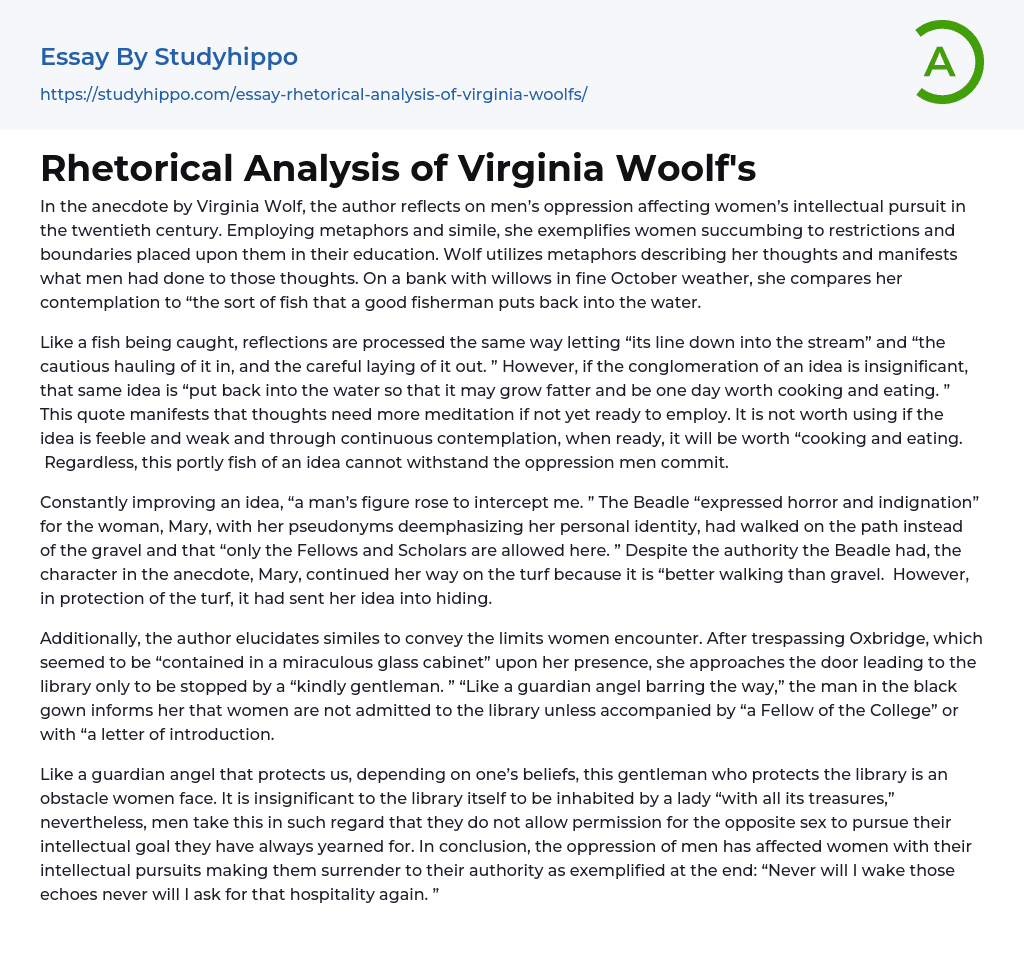Virginia Wolf's anecdote recounts men's suppression that impeded women's intellectual progress in the 20th century. She uses metaphors and similes to portray how women yielded to the educational limits set upon them. In her description, Wolf draws on metaphors to express her thought process and how it was influenced by men. She likens her contemplation to a fish set free by a skilled fisherman while sitting by a bank under willows in agreeable October weather.
Much like how a fish is captured, thoughts are similarly handled, being carefully "cast into the stream" and then mindfully reeled back in for closer inspection. However, if a concept appears to be trivial or unimportant, it is "returned to the water" in the hopes that it will eventually become ripe enough to be useful or "cooked and eaten." This notion signifies the necessity of adequat
...e deliberation before an idea can truly be utilized. If the thought is frail or weak, it is unworthy of application until it has been given ample time for maturation and when the time comes, it will be substantial enough for "cooking and eating". Yet, even this substantiality doesn't necessarily render an idea immune to mankind's relentless persecution.
The constant refinement of a thought was disrupted when "a male persona obstructed my path". Shock and indignation were the expressions demonstrated by the Beadle towards the woman, Mary. Her pseudonyms somehow downplayed her individuality as she chose to tread the pathway rather than the gravel, a privilege "reserved only for the Fellows and Scholars". Regardless of his clear authority, Mary persisted on her course on the grass as it provided "a superior walking experience than gravel". However, he
defiance had potentially endangered the turf, driving her initial notion into obscurity.
Moreover, the writer uses similes to highlight the barriers faced by women. Once she crossed into the territory of Oxbridge, described as being "encased in a spectacular glass box" at her arrival, she heads towards the library's entrance but is halted by a "benevolent gentleman." Compared to "a protecting angel blocking the path," this man in his black gown informs her that women are not allowed entry into the library without being escorted by "a Member of the College" or having "a recommendation letter."
Similar to a guardian angel watching over us, based on individual faiths, the male figure safeguarding this library presents a hurdle for women. The library being occupied by a lady "with all its treasures" bears no significance to the library itself, yet, men place such importance on this that they prevent the other gender from realizing their intellectual objectives they've long desired. Conclusively, female intellectual endeavors have been impacted by male dominance, leading them to submit to this authority, as demonstrated in the final statement: "Never will I wake those echoes never will I ask for that hospitality again."
- Alaska essays
- Boston essays
- Brazil essays
- California essays
- Canada essays
- Chicago essays
- Costa Rica essays
- Florida essays
- Hawaii essays
- Latin America essays
- Los Angeles essays
- Mexico essays
- Slavery In America essays
- Usa essays
- Virginia essays
- Washington essays
- Aldous Huxley essays
- Alice Walker essays
- Amy tan essays
- Anne Bradstreet essays
- Anton Chekhov essays
- Arthur Miller essays
- Augustine essays
- Bertolt Brecht essays
- Booker T Washington essays
- Carol ann duffy essays
- Charles Dickens essays
- Charlotte Perkins Gilman essays
- Chinua Achebe essays
- Christina Rossetti essays
- Consider The Lobster essays
- Edgar Allan Poe essays
- Elizabeth Bishop essays
- Emily Dickinson essays
- Ernest Hemingway essays
- F. Scott Fitzgerald essays
- George Orwell essays
- Harper Lee essays
- Homer essays
- James Baldwin essays
- Jane Austen essays
- John Donne essays
- John Steinbeck essays
- Kate Chopin essays
- Kurt Vonnegut essays
- Langston Hughes essays
- Leonardo Da Vinci essays
- Mark Twain essays
- Mary Shelley essays
- Maya Angelou essays




